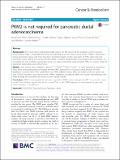| dc.contributor.author | Danai, Laura V | |
| dc.contributor.author | Di Vizio, Dolores | |
| dc.contributor.author | Hillis, Alissandra L. | |
| dc.contributor.author | Lau, Allison N. | |
| dc.contributor.author | Devoe, Camille X. | |
| dc.contributor.author | Vander Heiden, Matthew G. | |
| dc.contributor.author | Dayton, Talya Lucia | |
| dc.date.accessioned | 2018-11-05T15:33:43Z | |
| dc.date.available | 2018-11-05T15:33:43Z | |
| dc.date.issued | 2018-10 | |
| dc.date.submitted | 2018-07 | |
| dc.identifier.issn | 2049-3002 | |
| dc.identifier.uri | http://hdl.handle.net/1721.1/118876 | |
| dc.description.abstract | Background
While most cancer cells preferentially express the M2 isoform of the glycolytic enzyme pyruvate kinase (PKM2), PKM2 is dispensable for tumor development in several mouse cancer models. PKM2 is expressed in human pancreatic cancer, and there have been conflicting reports on the association of PKM2 expression and pancreatic cancer patient survival, but whether PKM2 is required for pancreatic cancer progression is unknown. To investigate the role of PKM2 in pancreatic cancer, we used a conditional allele to delete PKM2 in a mouse model of pancreatic ductal adenocarcinoma (PDAC).
Results
PDAC tumors were initiated in LSL-KrasG12D/+;Trp53flox/flox;Pdx-1-Cre (KP−/−C) mice harboring a conditional Pkm2 allele. Immunohistochemical analysis showed PKM2 expression in wild-type tumors and loss of PKM2 expression in tumors from Pkm2 conditional mice. PKM2 deletion had no effect on overall survival or tumor size. Loss of PKM2 resulted in pyruvate kinase M1 (PKM1) expression, but did not affect the number of proliferating cells. These findings are consistent with results in other cancer models.
Conclusions
PKM2 is not required for initiation or growth of PDAC tumors arising in the KP−/−C pancreatic cancer model. These findings suggest that, in this mouse PDAC model, PKM2 expression is not required for pancreatic tumor formation or progression. Keywords: PKM2; PDAC; Pyruvate kinase; Pancreatic cancer | en_US |
| dc.description.sponsorship | Damon Runyon Cancer Research Foundation (Grant DRG-2241-15) | en_US |
| dc.description.sponsorship | National Cancer Institute (U.S.) (Grant 5P30CA1405141) | en_US |
| dc.description.sponsorship | National Cancer Institute (U.S.) (Grant R01CA168653) | en_US |
| dc.publisher | BioMed Central Ltd | en_US |
| dc.relation.isversionof | https://doi.org/10.1186/s40170-018-0188-1 | en_US |
| dc.rights | Creative Commons Attribution | en_US |
| dc.rights.uri | http://creativecommons.org/licenses/by/4.0/ | en_US |
| dc.source | BioMed Central | en_US |
| dc.title | PKM2 is not required for pancreatic ductal adenocarcinoma | en_US |
| dc.type | Article | en_US |
| dc.identifier.citation | Hillis, Alissandra L et al. "PKM2 is not required for pancreatic ductal adenocarcinoma." Cancer & Metabolism 2018, 6 (October 2018): 17 © 2018 The Author(s) | en_US |
| dc.contributor.department | Massachusetts Institute of Technology. Department of Biology | en_US |
| dc.contributor.department | Koch Institute for Integrative Cancer Research at MIT | en_US |
| dc.contributor.mitauthor | Hillis, Alissandra L. | |
| dc.contributor.mitauthor | Lau, Allison N. | |
| dc.contributor.mitauthor | Devoe, Camille X. | |
| dc.contributor.mitauthor | Dayton, Talya L | |
| dc.contributor.mitauthor | Vander Heiden, Matthew G. | |
| dc.relation.journal | Cancer & Metabolism | en_US |
| dc.eprint.version | Final published version | en_US |
| dc.type.uri | http://purl.org/eprint/type/JournalArticle | en_US |
| eprint.status | http://purl.org/eprint/status/PeerReviewed | en_US |
| dc.date.updated | 2018-10-28T14:26:10Z | |
| dc.language.rfc3066 | en | |
| dc.rights.holder | The Author(s). | |
| dspace.orderedauthors | Hillis, Alissandra L; Lau, Allison N; Devoe, Camille X; Dayton, Talya L; Danai, Laura V; Di Vizio, Dolores; Vander Heiden, Matthew G | en_US |
| dspace.embargo.terms | N | en_US |
| dc.identifier.orcid | https://orcid.org/0000-0003-4250-7355 | |
| dc.identifier.orcid | https://orcid.org/0000-0002-7994-7963 | |
| dc.identifier.orcid | https://orcid.org/0000-0002-6702-4192 | |
| mit.license | PUBLISHER_CC | en_US |
